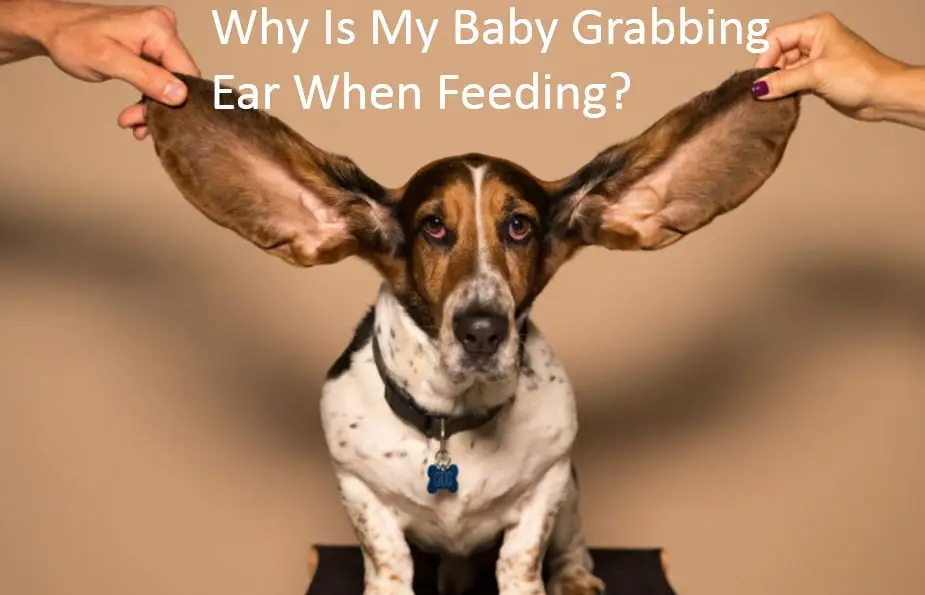Why Is My Baby Grabbing Ear When Feeding? (5 Common Reasons)

It may not seem like it, but the ears are one of the most sensitive and advanced body parts.
Besides their primary function, which is hearing, they also maintain a sense of balance.
But why is my baby obsessed with her ears? She keeps rubbing, pulling, touching and playing with her ears all the time, especially during feeding and bedtime.
Well, allow me to share with you 5 common reasons your baby picks at her ears.
Why Is My Baby Grabbing Ear When Feeding?
Many babies seem to be fascinated by their ears. As soon as they discover their ears, babies grab them during feeding or before going to sleep for several reasons. 1) Ear infection – if your baby has a temperature and is undergoing a respiratory infection. 2) Teething – if your baby has sore gums, flushed cheeks and excessive drooling. 3) Ear wax blockage – if you clean your baby’s ears with cotton buds. 4) If your baby inserted a foreign object into the ear. 5) Your baby likes to touch her ears as a self-calming mechanism.
1. Ear Infection
When your baby grabs ears while feeding, the first thing that is likely to come to mind blaming is an ear infection.
This may actually be a good guess because ear infection often occurs in babies. And provided your baby shows other typical symptoms and has a cold or other respiratory illness.
That’s because ear infection often develops after a sore throat, cold or runny nose. The fluid and mucus build up behind the eardrum, causing middle ear inflammation.
Other common symptoms of ear infection include:
- Earache,
- Fever,
- Fussiness and irritability,
- Difficulty feeding and sleeping.
The bottom line is–you will know (or at least suspect) that your baby has an ear infection because of these symptoms. If that’s the case, seek medical advice, as antibiotic treatment may be necessary.
2. Ear Wax Build-up and Blockage
The discomfort caused by ear wax build-up and blockage could also explain why your baby grabs and pulls her ears during feedings.
Whilst the ear wax build-up is generally harmless, it may cause unpleasant symptoms in babies. These include dizziness, ear ringing, pain, odour, itchiness, or mild hearing loss.
A doctor can diagnose ear wax build-up and blockage by a quick exam and, if required, treat it with either mineral oil, glycerine, ear drops, or saline solution.
Sometimes, the ear wax build-up is manually removed by a doctor with special instruments.
Baby ears normally do not need to be cleaned since they are designed to do so by themselves.
Basically, the excess wax will make its way to the outer ear with help from the jaw motion, like chewing.
This is visible on the outer ear excess wax you can wipe away with a clean cloth.
But never use a cotton swab or other home remedies to remove ear wax from a deeper part of the ear. It has the opposite effect – it pushes the ear wax further into the ear, which can lead to blockage, not to mention causing injuries to the eardrum.
In other words – clean your baby’s ears without sticking anything to them to prevent ear wax build-up!
Visit your healthcare provider for advice on the best method to avoid ear wax build-up and blockage.
3. Teething
Teething is yet another reason your baby grabs her ear during feeding.
And that’s because when the tooth breaks through the gums, it causes a general discomfort and pain that may radiate to the ears.
And pulling or tugging ears helps babies relieve this unpleasant sensation.
Sometimes it is quite tricky to tell the difference between an ear infection and teething because the nerves around the teeth and mouth are connected. So, if babies have gum ache or toothache – they will probably have an ear ache too.
However, you can look for symptoms specifically associated with teething to tell apart the two conditions and get appropriate treatment. (Although it isn’t much you can do to help your teething baby except to soothe their tender gummies).
These include excessive drooling, swollen gums, gnawing on hard items, flushed cheeks, fussiness and trouble sleeping.
4. Self-soothing Mechanism
Besides sucking on a thumb, pacifier or using a blankie, there are many other, and quite frankly, unconventional ways for babies to self-soothe.
Touching and grabbing their ears while feeding is apparently one of these quirky ways.
As babies grow, they discover different body parts and explore what they can do with them.
So, they often play with hair, rub their tummies, fiddle with belly buttons, or… rub their ears.
Rubbing ears feels good and helps babies relax and settle, especially when they are:
- Bored,
- Tired,
- Frustrated,
- Overwhelmed,
- Upset.
In fact, rubbing ears helps babies calm themselves because of the vagus nerve, and so-called auricular ear release.
Stimulation of the peripheral branch of the vagus nerve at the back of the ear reduces stress levels by sending signals to the central nervous system.
When babies touch and rub the area behind the ears or external ear, they activate the vagus nerve, which helps them calm down. Voila!
By 12 months, your baby will probably outgrow this habit and find another self-regulating technique.
Vagus Nerve Hack | Auricular Ear Release
Perhaps we should all incorporate ear massages into our daily routine!
Vagus Nerve Massage For Stress And Anxiety Relief
5. They Put Some Object Into The Ear Canal
Whether it is a bead, piece of toy, stone, button battery, or small food like beans or whatnot – poking objects into their ears or noses is a common occurrence in this age group.
And a very valid reason to visit an emergency room to get it out. Especially if the object involved is batteries or food – which may cause severe damage to your little one’s hearing.
So how do I know that my little genius lodged something in her ears besides grabbing and pulling the ear in question?
Well, you can probably see it. But if the foreign object goes undetected, it may cause swelling and ear inflammation, ear ache, fluid or blood leaking from the ear or even hearing loss.
Nevertheless, you should resist the temptation to remove it without using appropriate tools. That’s because you could push the obstacle deeper, making it harder to remove. So, you are better off seeking medical advice.
Final Few Lines
The bottom line is that most babies when they discover their ears, they become fascinated by them. The same goes for other body parts.
So in most cases, if you see your baby playing with her ears–likely it’s nothing to worry about. It may be just a self-calming mechanism.
However, if touching ears is accompanied by other symptoms, then depending on these symptoms, it may mean different things:
- Ear infection,
- Ear wax blockage,
- Presence of a foreign object inside the ear,
- Teething.
